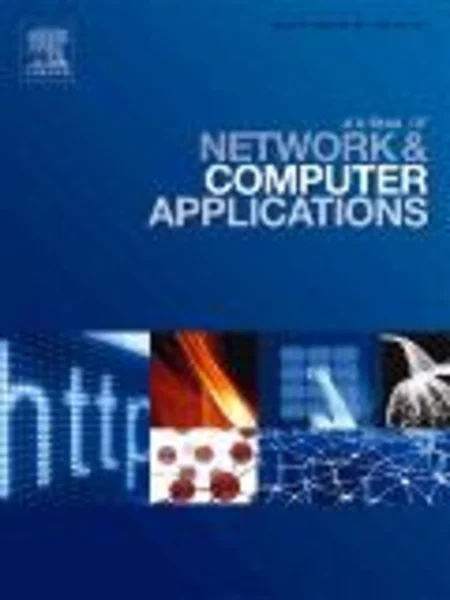-
an ant-based rate allocation algorithm for media streaming in peer to peer networks: extension to multiple sessions and dynamic networks
جزئیات بیشتر مقاله- تاریخ ارائه: 1392/07/24
- تاریخ انتشار در تی پی بین: 1392/07/24
- تعداد بازدید: 800
- تعداد پرسش و پاسخ ها: 0
- شماره تماس دبیرخانه رویداد: -
in this paper, we introduce a novel algorithm for rate allocation in media streaming p2p networks where multimedia contents are distributed among network members and streamed toward any requesting peer. the proposed algorithm is based on ant-colony optimization. it is capable of handling network dynamism, which is an inherent property of unstructured p2p networks. another advantage of our algorithm is its ability to get over uncertainties in network state information, particularly the rate of supplying peers that could happen due to lack of accurate measurements. in addition, the suggested method does not rely on any information about the topology of the network.we have investigated both single and multiple streaming sessions scenarios in which more than one peer is receiving media streams from media providers. we show that the suggested algorithm will reach the maximum achievable rate of the network quite fast. a key feature of the proposed algorithm is its low pass filter property, which makes it discriminate between transient and permanent network changes. if the changes are transient, the algorithm easily and rapidly compensates the temporary losses. in cases where the network changes last longer, the algorithm overcomes losses by employing other nodes that have the media stream available. the rate of adaptation is adjustable and must be carefully determined according to network conditions. moreover, adaption rate is not constant and varies during the streaming session. this results in uninterrupted services for current users in cases where multiple sessions are present in the network.finally, since we have assumed that fountain codes are used to encode media streams in the p2p networks, the suggested algorithm does not require the user to receive different parts of the streams according to a predefined order and from a specific list of media suppliers. it suffices that the user gets as many stream chunks as necessary, regardless of their order or the fact that not all the media suppliers have all the parts available. in other words, using fountain codes enables us to overcome a big difficulty of p2p media streaming and that is to receive different parts of media streams according to a specific order.
مقالات جدیدترین رویدادها
-
استفاده از تحلیل اهمیت-عملکرد در ارائه الگوی مدیریت خلاقیت سازمانی و ارائه راهکار جهت بهبود
-
بررسی تاثیر ارزش وجوه نقد مازاد بر ساختار سرمایه شرکت های پذیرفته شده در بورس اوراق بهادار تهران
-
بررسی تأثیر سطح افشای ریسک بر قرارداد بدهی شرکت های پذیرفته شده در بورس اوراق بهادار تهران
-
بررسی تأثیر رتبه بندی اعتباری مبتنی بر مدل امتیاز بازار نوظهور بر نقد شوندگی سهام با تأکید بر خصوصی سازی شرکت ها
-
تأثیر آمیخته بازاریابی پوشاک ایرانی بر تصویر ذهنی مشتری پوشاک ایرانی (هاکوپیان)
-
بررسی آزمایشگاهی تاثیر فاصله در ضریب راندمان گروه شمع ها
-
مطالعه مکانیسم تشکیل برخی بافتهای خاص موجود در استوک گرانیتوئیدی آب تلخون، استان کرمان
-
چگونه مفهوم اقتصاد مقاومتی وحمایت از تولید ملی را در دانش آموزانم نهادینه نمودم؟
-
بررسی روند تاثیر پذیری زمین لغزش به پهنه بندی تکتونیک فعال حاصل از شاخص smf
-
removal of pb(ii) from aqueous solution using dithiocarbamate modified chitosan beads with pb(ii) as imprinted ions
مقالات جدیدترین ژورنال ها
-
مدیریت و بررسی افسردگی دانش آموزان دختر مقطع متوسطه دوم در دروان کرونا در شهرستان دزفول
-
مدیریت و بررسی خرد سیاسی در اندیشه ی فردوسی در ادب ایران
-
واکاوی و مدیریت توصیفی قلمدان(جاکلیدی)ضریح در موزه آستان قدس رضوی
-
بررسی تاثیر خلاقیت، دانش و انگیزه کارکنان بر پیشنهادات نوآورانه کارکنان ( مورد مطالعه: هتل های 3 و 4 ستاره استان کرمان)
-
بررسی تاثیر کیفیت سیستم های اطلاعاتی بر تصمیم گیری موفق در شرکتهای تولیدی استان اصفهان (مورد مطالعه: مدیران شرکتهای تولیدی استان اصفهان)
-
تأثیر سیستم های اطلاعات حسابداری بر موفقیت بانک ها
-
سیستم های اطلاعاتی حسابداری: چالش در گزارشگری به هنگام
-
قواعد و فواید تسعیر اختیاری در بازار اسلامی با انطباق بر فقه المکاسب
-
بررسی عوامل موثر بر تعلق خاطر شغلی در سازمان
-
structural vulnerability assessment of historical buildings in turkey




سوال خود را در مورد این مقاله مطرح نمایید :